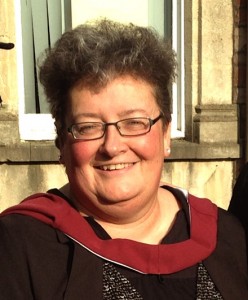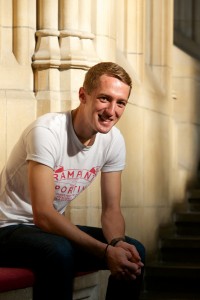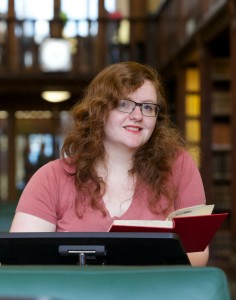 Louise Wingrove is a third-year postgraduate researcher in the department of Drama: Theatre, Film and Television. Her research is focused on how the lives of working women were represented by serio-comediennes on the Victorian music-hall stage, using the characters and careers of Jenny Hill (1848-1896) and Bessie Bellwood (1856-1896) as case studies. Most of her research is archive based, piecing together long lost careers, songs and venues through files of reviews, photographs and sheet music.
Louise Wingrove is a third-year postgraduate researcher in the department of Drama: Theatre, Film and Television. Her research is focused on how the lives of working women were represented by serio-comediennes on the Victorian music-hall stage, using the characters and careers of Jenny Hill (1848-1896) and Bessie Bellwood (1856-1896) as case studies. Most of her research is archive based, piecing together long lost careers, songs and venues through files of reviews, photographs and sheet music.
This is Louise’s third entry for the ‘Year in the Life of a PhD’ blog. Her first entry, entitled ‘Belonging in archives’, discussed the challenges of finding your niche as a researcher and the joy of learning new skills, and Louise reflects on her experiences and what lies ahead in her second post ‘New Year’s revelations’.
Entering my write up stage, I am strangely surprised to find that the clichéd phrase “the time will fly by” uttered to me so many times at the start of my PhD is completely true. It has been a whirlwind of nineteenth century studies, learning curves and more personal realisations than I can count and I have loved it more than I ever imagined. Now, having felt and acknowledged the imposter syndrome and panic attacks, it is a preoccupation with preconceptions, clichés and misrepresentation that is currently plaguing me.
I am a Chihuahua owning, dyspraxic, ex-bibliophobic PhD student with an almost unhealthy sitcom and RuPaul’s Drag Race obsession. Each of these things in isolation are pre-loaded with assumptions and clichés about my personality, whether representative or not. Even my choice of Music Hall comediennes as a topic for research comes with many preconceptions – something I am sure we all find when trying to explain the nuances of our study to someone else.
My clichéd preoccupations initially began after realising that I had had the following conversation to the point of it becoming a cliché:
Lovely person who doesn’t realise the can of worms they are opening: “So, how many words do you have to write for a PhD? Really? How can you write that much?”
Me: *not at all trying to be smug, but maybe with a little too much pride* “Well, it’s more like how can I possibly fit in all I have to say – I have too much material and not enough room!”
I heard people answer in the same way before I started my PhD, and I have fallen into the cliché myself. What I don’t say, however, is that at each stage I too have wondered how I would make the word count. By studying performers whose huge popularity is now largely forgotten, I (secretly) worried that I would be lucky to scrape enough material together. Then I learnt more about their careers, their personal lives, the importance of placing their work within a social historical context and the separating of truth from urban myth, and I soon discovered there was a lot to cover. This resulted in my choosing only two performers to research. This again filled me with a “not enough material” panic until I went even deeper and found myself surrounded by so many different spreadsheets and case studies that were “vital” that I couldn’t possibly cut it down without major tantrums.
During this, I found the truth in another piece of advice given to the point of it becoming a cliché –the importance of your relationship with your supervisor. I have always said I have been exceptionally lucky to have such an amazing supervisor, but it was at this point I really began to understand the importance of this relationship. Her ability to both calm and offer constructive suggestions of ways to order and present the wealth of research obtained in an archival approach has been integral to getting me through my study. My research content continually shifts, affecting the usefulness of different ways of presenting the data. However, each way we discuss has made it clearer to me whilst allowing me to follow my instinct and calmly continue on to my next hurdle. This stable relationship has even enabled me to send work off to be looked at without the crippling fear that I will get an email back simply saying “Why?” and “Give up!”
But it is now that I am facing my biggest cliché, preconception and misrepresentation hurdle of all – how to represent Jenny Hill and Bessie Bellwood. On a simple level, I am myth busting; showing how preconceptions surrounding these comediennes careers and materials are flawed. It’s about showing how performers engaged and reflected a variety of social issues and me challenging assumptions surrounding the working methods of these women and what they wished to represent to an audience. On a more complex level – I have fallen in love with Hill and Bellwood! I feel like I know them exceptionally well, making me overprotective of them. This makes me want to include every tiny thing I know about them and cut nothing so as to build a full picture, highlighting their good and explaining any ‘questionable behaviour’ as I don’t want people to form assumptions about them. I wouldn’t only want to be remembered and represented by one aspect of my life, which could skew understanding of my complexities as a person. I’m not only a Chihuahua owner! I must remain objective, documenting their career development and material and, ironically, the ways in which their reputations were possibly misrepresented by the press to keep them within social ideals and constructs. To represent them properly, I must learn to distance myself as I am building a picture of them based on archive materials, not on my first hand knowledge of them as living people.
So now, I must face up to the biggest drama cliché of all and “cut my baby,” represent them as best I can and stay thankful to all the support around me. And possibly buy shares in Rescue Remedy for all the tantrums!


















